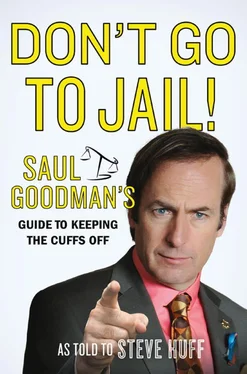• Acting as your own attorney will probably cost more money than hiring an attorney.It will. I feel like I should repeat this about ten more times. Because acting as your own attorney almost definitely will cost you more money than just hiring counsel in the first place. The main reason? Chances are you will lose the case, be found guilty, and have to do some kind of time (or if you are super lucky, probation). Oh, and fines. The civil servants on the other side of that courtroom—if we’re talking about criminal law—have salaries to fund, they have other budgets to make, and fellow prisoners in the county jail to feed cheeseburgers and grape juice. And those fines, especially if you’ve fumbled at the law like you’re a pair of tenth-graders in the backseat of a Subaru, could be steeper than if you’d had a professional in court negotiate on your behalf. And civil court? Holy cats. Represent yourself civilly and you could end up on the hook for court costs and attorney fees on the other side. Those guys have the finest suits and biggest offices in the slickest buildings, and they will not hesitate to put you on the hook for everything if you are the losing party.
* * *
Let’s pause, take a breath, and hope I’ve made my point before I go on. I admit that there will always be a few special souls who are convinced they can go it alone. And if you’re one of them, I applaud your moxie. Because to face a court of law with your wits and whatever legal training you picked up from the Google school of law—and that one cousin who’s been to jail so much he really knows stuff, man —takes courage.
So you’re ready, you say. Stand at the courtroom doors. Take a deep breath. Kick open the gates to your salvation, and pray you’ve done some of the things I’ll list below.
And remember, this is just a skeleton guide. I’m offering you the bare bones strategy of representing yourself in a court of law. It’s up to you to put the skin on, by way of involved, intense, in-depth research on your own. (Don’t even try to fake the guts and organs; it won’t work and you don’t have enough time to try.)
IF AT ALL POSSIBLE, LIVE INSIDE A COURTROOM
No, don’t set up a tent and a Coleman stove and sing campfire songs with the bailiffs. What I mean is: head to your local courthouse and sit in on a few proceedings. Many courthouses have hearings open to spectators and believe me, there will be spectators. Journalists, cops with an interest in a particular case, families of the people involved, you name it. My favorites are the people who just like to hang out because it’s interesting to them. Some of them are kind of weird, sure, and probably attend strangers’ funerals, too. But if you were to set up camp in a courtroom, they’d be the ones to join along in campfire songs, not the bailiffs. Anyway, get in there and get a feeling for how things work. And forget what I said about campfires in the courtroom, that’s the first thing they advise against in “Arson for Dummies.”
FIGURE OUT THE BASICS
By basics, I mean rules and procedures. Every court has a set of them and they can be incredibly, ridiculously detailed. Get them from the court clerk and learn them like you’re converting to a new religion and they comprise the holy book. If the Word of the Judge is that anyone born in the month of May must air guitar for two minutes to “Purple Haze” before addressing the court, then you’d better channel Hendrix and set that invisible Strat on fire. Judges won’t have rules that whimsical, but you can see where I’m going with this.
Most remaining bookstores, the ones that haven’t lost the fight against the Internet, will have shelves upon shelves packed with books chockfull of helpful information about the law. Buy those books. Keep reading this book, obviously, but also buy them. Dust off those number 2 pencils and grab every legal pad you can find—they’re called legal pads for a reason!—and that will bring us to…
BREAK THE CASE INTO PARTS
Step one: you gotta pay close attention to the trees in order to understand the forest. I’m not referring to the massive quantities of paper consumed by even the smallest practices as we diligently pursue our clients’ best interests—I’m encouraging you to examine the elements of the case you’re embarking to defend. This is probably good news for you, because the job ahead can look like a big brown avalanche of crap, and it’s your job to strap on the ol’ flood pants, wade into that fetid pile, and parse each individual bowel movement. Maybe I’m not helping with that comparison. I’m just saying: take the case apart, piece by piece, and figure out how to prove each part. Real quick, here’s a look at the usual elements of something civil, like negligence.
Let’s say a retail business in a wintry city has a duty to customers to keep the sidewalk in front of the store clear of snow and ice. One hard winter, the manager feels a little shoulder strain while shoveling and looks around, figuring half-done is done enough. But wait! There’s still ice on that walk! And along comes a young man in his prime, not wearing cleats or spikes or whatever, because he’s not a soccer player and he’s pretty used to trusting that businesses have their customers’ safety in mind and are going to shovel their walks. Whooosh! This young man takes a header on the slick sidewalk, gets a concussion, or throws out his back. He gets hurt, this poor kid. How will he ever be able to cheer on his dear mother at her weekly pinochle tournament? All because the man in charge of the store, in a moment of weakness, breached his duty to his customers.
If the young man doesn’t work out something with the store owner on the spot—some baseline fee just to keep the courts out of it—and he decides to sue, he has to prove that but for the icy sidewalk, he would never have cracked his skull or slipped a disc or wound up with whatever injury it was that he suffered. Also, he’s got to prove that the defendant here, Mr. Rushy St. Businessman, could have easily predicted what was going to happen. In this case, I can guarantee for a fact the business owner knew the potential consequences. So those are the first parts: the who, what, when, where, why, and how.
The last piece of the puzzle is determining what the damages are. That ties everything together, as we add up the young man’s medical bills and all his traumatic pain and suffering. Once we can put a number on that, we’ve tied the knot on this cherry stem of a negligence case.
LEARN RULES OF EVIDENCE
Evidence is everything, and there are rules for dealing with it. They can be pretty complicated, so turn into that obnoxious kid in class who raises her hand after every sentence her teacher says when it comes to asking questions about rules of evidence. You might be able to fumble some other details and survive, but without the admissible documents or whatever other evidence you’ve got to support your case? Might as well give the bailiff your jumpsuit measurements and bid farewell to your grandma—it’s over the river and through the wood to the state penitentiary you go. You’re screwed unless you get the evidence situation on lockdown.
I’m not going to sugar-coat this point: rules of evidence can be a bear. Not a cuddly Teddy Bear with button eyes—a ferocious hiker-eating grizzly type bear. Here’s just one example of the way that bear can eat up precious brain-space: in the Federal Rules of Evidence, Rule 401 tells how to figure out whether evidence is actually relevant to the case or not. It says evidence is relevant if it “has any tendency to make a fact more or less probable than it would be without the evidence” and also “is of consequence in determining the action.” Almost as simple as legal language ever gets. But— then there are paragraphs of notes below those points that go deeper and deeper into what makes a relevant piece of evidence and why. If your eyes aren’t crossing by the end of paragraph two, it will be a minor miracle. If you don’t want to walk into court and slop folders and boxes full of documents and transcripts in front of the judge only to have him or her rule it’s all completely useless regarding your case, you will want to have a nodding acquaintance with those notes as well.
Читать дальше












